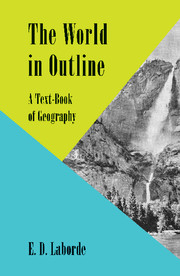Human Geography
from PART IV - NORTH AMERICA
Published online by Cambridge University Press: 05 June 2016
Summary
Discovery and Settlement. It has been said that Columbus did not discover America, but only the way there and back. This is true to the extent that in A.D. 986 a Norwegian settler in Iceland named Bjarni Herjolfsson was blown by a storm on to a coast which has been identified as that of Nova Scotia. Four years later, Leifr Eiriksson set out to explore the land seen by his friend Bjarni and during his voyage certainly went as far south as Cape Cod and perhaps to the coast of Virginia. The land was named Wineland, because of the grapes which were found growing there. But the Norsemen found richer and easier fields for adventure along the coasts of western Europe, where they so exhausted their resources that the Wineland settlement was left unsupported. Their discovery of the western continent was forgotten by all save the remote Icelanders, who recorded it in their sagas.
At the end of the fifteenth century, when the spirit of adventure was high and men were eager to discover what lands lay beyond the narrow confines which then comprised the world, Christopher Columbus succeeded in persuading the King and Queen of Spain to send out a voyage of discovery to the west. Columbus said that his purpose was to reach the Far East by a short sea journey, but it has been said that while on a voyage to Iceland he had heard of the existence of Wineland and knew beforehand of the existence of the land which he ‘discovered’. However this may be, to him is due the credit for having found out and put into practice the sailing route westwards along the Trades from the Canary Islands to the West Indies and back eastwards along the Southwest Antitrades from Bermuda to Portugal. Columbus's discoveries were at once followed by the Spanish conquest and occupation of the West Indies, Central America, and Mexico. It is interesting to notice that the Spaniards, who were accustomed to a Mediterranean climate in Europe, did not penetrate northwards beyond the subtropical regions of America.
- Type
- Chapter
- Information
- The World in OutlineA Text-Book of Geography, pp. 329 - 339Publisher: Cambridge University PressPrint publication year: 2013



